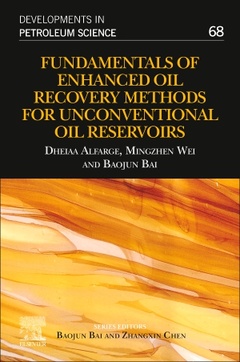Fundamentals of Enhanced Oil Recovery Methods for Unconventional Oil Reservoirs Developments in Petroleum Science Series
Auteurs : Alfarge Dheiaa, Wei Mingzhen, Bai Baojun

Fundamentals of Enhanced Oil Recovery Methods for Unconventional Oil Reservoirs, Volume 67 provides important guidance on which EOR methods work in shale and tight oil reservoirs. This book helps readers learn the main fluid and rock properties of shale and tight reservoirs?which are the main target for EOR techniques?and understand the physical and chemical mechanisms for the injected EOR fluids to enhance oil recovery in shale and tight oil reservoirs. The book explains the effects of complex hydraulic fractures and natural fractures on the performance of each EOR technique.
The book describes the parameters affecting obtained oil recovery by injecting different EOR methods in both the microscopic and macroscopic levels of ULR. This book also provides proxy models to associate the functionality of the improved oil recovery by injecting different EOR methods with different operating parameters, rock, and fluid properties. The book provides profesasionals working in the petroleum industry the know-how to conduct a successful project for different EOR methods in shale plays, while it also helps academics and students in understanding the basics and principles that make the performance of EOR methods so different in conventional reservoirs and unconventional formations.
1. Introduction of shale and tight oil reservoirs 2. CO2-EOR in shale and tight oil reservoirs 3. Comparative analysis between CO2-EOR mechanisms in conventional reservoirs versus shale and tight reservoirs 4. Natural Gases Based EOR Versus CO2-EOR in Shale and Tight Oil Reservoirs 5. Air injection in shale and tight oil reservoirs 6. Water injection in shale and tight oil reservoirs 7. Chemical EOR methods for unconventional reservoirs 8. Selection Criteria for Miscible-Gases Based EOR in ULR 9. Other EOR methods 10. The effects of nanopore confinement on different EOR methods 11. The impacts of geomechanics coupling on different EOR methods 12. Comparative and optimization of the most applicable EOR methods
Geologists, Geophysicists, Geochemists, Exploration Geologists, Petroleum Engineers, Reservoir Engineers, Production Engineers
Dr. Mingzhen Wei, Associate Professor at Department of Geosciences and Geological and Petroleum Engineering (GGPE), Missouri S&T. Dr. Wei was well trained in Petroleum Engineering (B.S. and M.S.) and Computer Science (Ph.D.). Her Ph.D. research was data management, data quality enhancement, applications of data mining and advanced artificial intelligence computation in Petroleum Engineering. She had two years of experience in metadata modeling with Center of Excellence for Geospatial Information Science (CEGIS), U.S. Geological Survey (USGS) as a postdoc. She has been devoted her time on Enhanced Oil Recovery (EOR) and unconventional energy resources using reservoir simulation and data analytics methods. Dr. Wei has her research team work well published, with 100+ publications on prestigious journals and varied Society of Petroleum Engineers (SPE) and other conferences.
Dr. Baojun Bai is a Professor and the holder of the Lester R. Birbeck Endowed Chair in Petroleum Engineering Prog
- Provides a general workflow for how to conduct a successful project for different EOR methods in these shale plays
- Provides general guidelines for how to select the best EOR method according to the reservoir characteristics and wells stimulation criteria
- Explains the basics and principles that make the performance of EOR methods so different in conventional reservoirs versus unconventional formations
Date de parution : 09-2020
Ouvrage de 286 p.
15x22.8 cm
Thèmes de Fundamentals of Enhanced Oil Recovery Methods for... :
Mots-clés :
air injection; bubble point shifting; capillary pressure; chemical EOR in unconventional reservoirs; CO<; ce:inf>; 2<; /ce:inf>; -EOR data analysis; CO<; ce:inf>; 2<; /ce:inf>; -EOR huff-n-puff; CO<; ce:inf>; 2<; /ce:inf>; -EOR lab database; CO<; ce:inf>; 2<; /ce:inf>; -EOR mechanisms in conventional reservoirs; CO<; ce:inf>; 2<; /ce:inf>; -EOR mechanisms in shale and tight oil reservoirs; CO<; ce:sup>; 2<; /ce:sup>; -EOR; combination of reservoir simulation with field production data; combustion; design of experiments (DOE); dry; EOR history matching; EOR methods in unconventional reservoirs; EOR methods simulation; foam air injection; geomechanics coupling; huff-n-puff versus flooding mode; hydraulic fracturing; IOR methods in shale oil reservoirs; microbial EOR methods; nanopore confinement; nanopores effects; natural gases-based EOR; oil; one parameter at a time (OPAAT); response surface methodology (RSM); selection criteria for miscible gases-based EOR in ULR; sensitivity analysis in shale and tight oil reservoirs; shale; shale oil phase behavior; shale oil reservoir simulation; shale oil reservoirs; surfactant huff-n-puff; thermal EOR methods; tight oil; tight oil reservoirs; unconventional EOR methods; unconventional liquids rich reservoirs; unconventional miscible-gas EOR; unconventional reservoirs development; water flooding in unconventional reservoirs; water huff-n-puff; water imbibition mechanisms; wet



